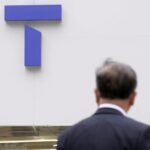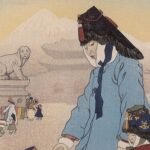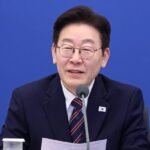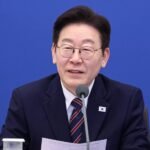JSW Group Chairman Sajjan Jindal (left) and POSCO Group Chairman Chang In-hwa shake hands after signing a memorandum of understanding in Mumbai on Oct. 21, 2024 (Courtesy of POSCO Group)
South Korea’s POSCO Group joined hands with India’s JSW Group to set up an integrated steel plant in the South Asian country with an estimated investment of billions of dollars targeting the sector’s rapid growth in the world’s fifth-largest economy.
POSCO Holdings Inc., the parent of the world’s seventh-largest steelmaker POSCO, said on Tuesday it signed a memorandum of understanding with JSW to cooperate on steel, battery materials and renewable energy sectors.
POSCO and JSW agreed to build an integrated steel plant capable of producing 5 million tons a year, with provisions for capacity expansion in Odisha. The two groups plan to each contribute half of the investment, which is expected to be in the billions of dollars, industry sources in Seoul said.
“We hope the partnership with JSW group will contribute to the economic development between Korea and India while leading the transition to an eco-friendly era,” POSCO Group Chairman Chang In-hwa said in a statement.
“POSCO will actively invest in future growth by increasing overseas investment centered on the upstream steel production process to overcome tightening economic blocs and secure competitive edges.”
The collaboration came as India’s steel demand is expected to rapidly grow. The local steel demand was forecast to more than triple to 400 million tons by 2047 from 120 million tons last year, POSCO said, citing data from World Steel Dynamics.
SECOND ATTEMPT IN 19 YEARS
Demand for automotive steel plates surged on the growing vehicle production, while increasing projects for infrastructures such as roads and ports ramped up reinforcing bars, industry sources said.
POSCO currently operates a rolling mill in Maharashtra to produce cold-rolled steel sheets for automakers such as India’s No. 1 car seller Maruti Suzuki India Ltd., Hyundai Motor Co. and Kia Corp. The Indian unit processes materials exported from POSCO’s plants in South Korea.
POSCO had decided to build an integrated steel plant in Odisha with an $12 billion investment in 2005 but dropped the plan due to protests from locals in 2017.
The leading South Korean steelmaker had agreed to build such a facility with India’s Adani Group in 2022 but changed the partner to JSW as it is the South Asian country’s top steelmaker, which POSCO expects to help the project succeed.
COMPETITION WITH CHINA
The integrated steel plant in India is predicted to allow POSCO to improve its profitability mired by the intensifying competition with Chinese rivals, industry sources said.
POSCO Holdings’ operating profit was forecast to fall to around 3 trillion won ($2.2 billion) on a consolidated business this year from 3.5 trillion won in 2023 and 4.9 trillion won in 2022 as its steel business, which makes up about 60% of the group’s profit, struggled due to the competition.
POSCO’s stainless plant in China (File photo by Yonhap)
POSCO, which operates integrated steel plants in South Korea, China, Vietnam and Indonesia to meet local demand with lower logistics costs, aims to boost its profits from overseas steel businesses with the new Indian production base. Its profit from overseas steel businesses shrank to only 194 billion won last year from 1.5 trillion won in 2021.
Chang sought a new overseas integrated steel plant to restore the group’s steel business.
He was known to have told employees that the group needs to increase investments in countries such as the US, India and Indonesia where steel demand grows, according to industry sources in Seoul.
The remarks caused expectations that POSCO may seek an integrated steel plant with electric arc furnaces in the US, the sources said.
By Hyung-Kyu Kim
khk@hankyung.com
Jongwoo Cheon edited this article.















